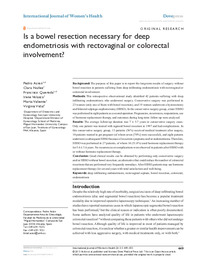Please use this identifier to cite or link to this item:
https://hdl.handle.net/11000/30947Full metadata record
| DC Field | Value | Language |
|---|---|---|
| dc.contributor.author | Acién, Pedro | - |
| dc.contributor.author | Núñez, Clara | - |
| dc.contributor.author | Quereda Seguí, Francisco José | - |
| dc.contributor.author | Velasco, Irene | - |
| dc.contributor.author | Valiente, Marta | - |
| dc.contributor.author | Vidal, Virginia | - |
| dc.contributor.other | Departamentos de la UMH::Salud Pública, Historia de la Ciencia y Ginecología | es_ES |
| dc.date.accessioned | 2024-02-02T09:07:55Z | - |
| dc.date.available | 2024-02-02T09:07:55Z | - |
| dc.date.created | 2013-07-26 | - |
| dc.identifier.citation | International Journal of Women's Health 2013 Jul 29:5:449-55 | es_ES |
| dc.identifier.issn | 1179-1411 | - |
| dc.identifier.uri | https://hdl.handle.net/11000/30947 | - |
| dc.description.abstract | Background: The purpose of this paper is to report the long-term results of surgery without bowel resection in patients suffering from deep infiltrating endometriosis with rectovaginal or colorectal involvement. Methods: This retrospective observational study identified 42 patients suffering with deep infiltrating endometriosis who underwent surgery. Conservative surgery was performed in 23 women (only one of them with bowel resection), and 19 women underwent a hysterectomy and bilateral salpingo-oophorectomy (HBSO). In the conservative surgery group, a later HBSO was performed in eight patients as a second operation. Pregnancies, recurrences, reoperations, use of hormone replacement therapy, and outcomes during long-term follow-up were analyzed. Results: The average follow-up duration was 7 ± 5.7 years in conservative surgery cases. Only one patient was treated with sigmoid bowel resection in 1997 and had complications. In this conservative surgery group, 13 patients (56%) received medical treatment after surgery, 10 patients wanted to get pregnant (of whom seven [70%] were successful), and eight patients underwent a subsequent HBSO because of recurrent symptoms and/or endometrioma. Therefore, HBSO was performed in 27 patients, of whom 14 (51.8%) used hormone replacement therapy for 5.6 ± 3.6 years. No recurrences or complications were observed in patients after HBSO with or without hormone replacement therapy. Conclusion: Good clinical results can be obtained by performing only conservative surgery and/or HBSO without bowel resection, an alternative that could reduce the number of colorectal resections that are performed very frequently nowadays. After HBSO, patients may use hormone replacement therapy for several years with total satisfaction and well-being. | es_ES |
| dc.format | application/pdf | es_ES |
| dc.format.extent | 7 | es_ES |
| dc.language.iso | eng | es_ES |
| dc.publisher | Taylor and Francis Group [Commercial Publisher] Dove Press [Imprint] | es_ES |
| dc.rights | info:eu-repo/semantics/openAccess | es_ES |
| dc.rights.uri | http://creativecommons.org/licenses/by-nc-nd/4.0/ | * |
| dc.subject | bowel resection | es_ES |
| dc.subject | colorectal | es_ES |
| dc.subject | deep infiltrating endometriosis | es_ES |
| dc.subject | endometriosis | es_ES |
| dc.subject | rectovaginal septum | es_ES |
| dc.title | Is a bowel resection necessary for deep endometriosis with rectovaginal or colorectal involvement? | es_ES |
| dc.type | info:eu-repo/semantics/article | es_ES |
| dc.relation.publisherversion | https://doi.org/10.2147/IJWH.S46519 | es_ES |

View/Open:
Is a bowel resection necessary for deep endometriosis with rectovaginal or colorectal involvement.pdf
1,02 MB
Adobe PDF
Share:
.png)
